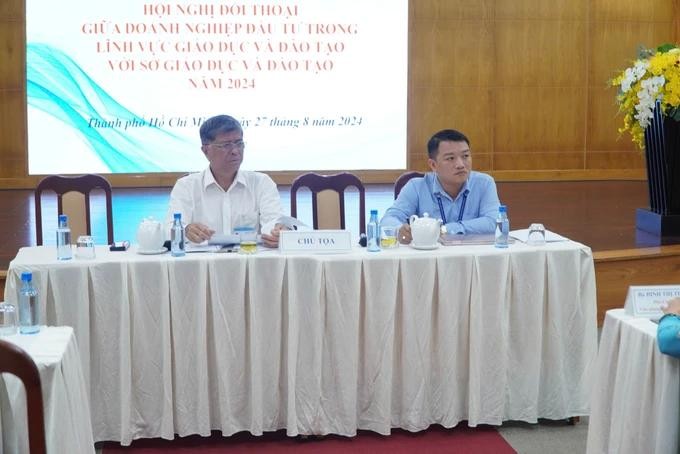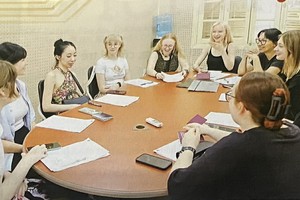
The working session was attended by various department representatives and over 110 enterprises across the city.
According to Head Ta Thi Minh Thu of the Non-Public Education Management Division under the Department of Education and Training, non-public educational institutions currently face several difficulties, including fire safety conditions, policy regimes, organizational personnel. Other challenges include recruiting and utilizing foreign teachers, educational partnerships, bidding processes, and administrative procedures for establishing educational activities—all of which involve tax regulations.
Principal Phan Thi Anh Hoang of Nam Viet Secondary and High School in Tan Phu District highlighted the reality that educational land planning is not allocated for private schools. Consequently, investors must lease and renovate facilities to adapt them for educational purposes. However, the lengthy legal paperwork process poses challenges and queries from educational institutions often receive vague answers without local government support.
In response to these concerns, representatives from the Ho Chi Minh City Department of Natural Resources and Environment explained that the available land for educational investment is limited, even within the public school system. Many school construction projects rely on compensation and land clearance. For private non-public school projects, investors must follow the prescribed procedures for changing land use purposes.
However, under the new Land Law which is effective from August 1, 2024, conversion of agricultural land to non-agricultural purposes requires specific documentation.
Regarding individual residential land, district-level People’s Committees have the authority to approve projects with multiple land use purposes. For organizational land, businesses can contact the Department of Natural Resources and Environment for guidance on the necessary procedures to submit to the Ho Chi Minh City People’s Committee for approval.
Investor Van Ton Dat of Sai Gon Sang Tao Kindergarten in District 10 raised a question about the city’s support for ensuring fire safety documentation during educational investment. In practice, many educational institutions use residential properties for educational purposes, making it challenging to meet fire safety standards.
The city's police representatives responded by elaborating that preschools, kindergartens, and nurseries with three floors or more, as well as those with volume above 3,000 cubic meters, are included in the list of projects entitled to fire safety approval as per Government Decree 50/2024/ND-CP.
Likewise, elementary, middle, and high schools with different grade levels and a volume bigger than five thousand cubic meters are included in this group. Included are educational institutions, colleges, universities, vocational schools, and normal education facilities that have five floors or more, as well as spaces with a volume greater than 5,000 cubic meters.
This regulation applies nationwide. The city only considers flexible solutions for construction projects initiated before 2001—the time when the Fire Prevention and Fighting Law came into effect, emphasized the Ho Chi Minh City Police representative.
This regulation is applicable across the country. The spokesman of the Ho Chi Minh City Police stressed that the city only takes into account adaptable solutions for construction projects started prior to 2001.
Director Nguyen Van Hieu of the Department of Education and Training revealed that currently, over 20 percent of the city’s students attend non-public educational institutions with foreign elements.
The statement above indicates a significant contribution from non-public educational institutions; thereby, meeting the diverse learning needs of the city’s residents. Hence, the city’s leadership consistently focuses on removing difficulties and creating favorable conditions for business investments in education, contributing to the overall improvement of educational quality in the city.
























